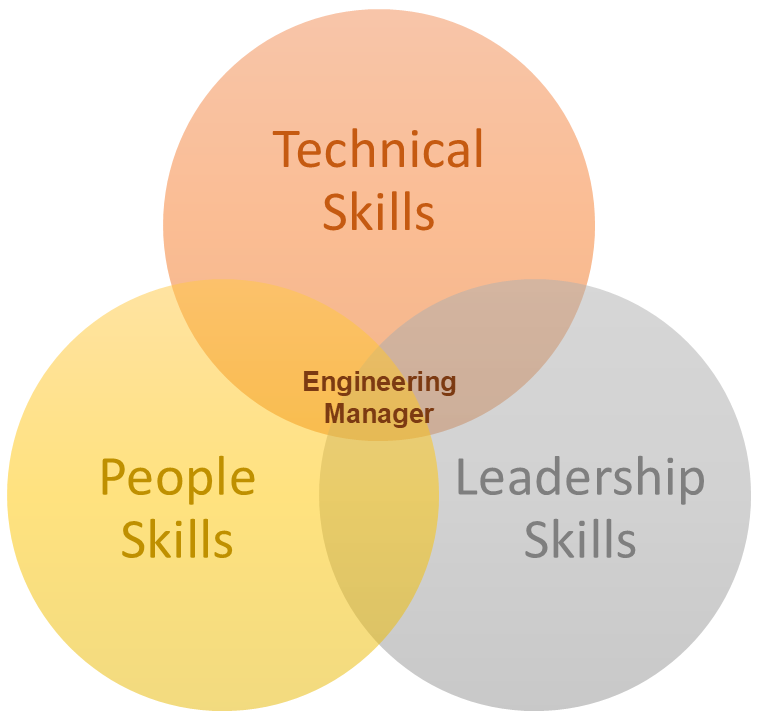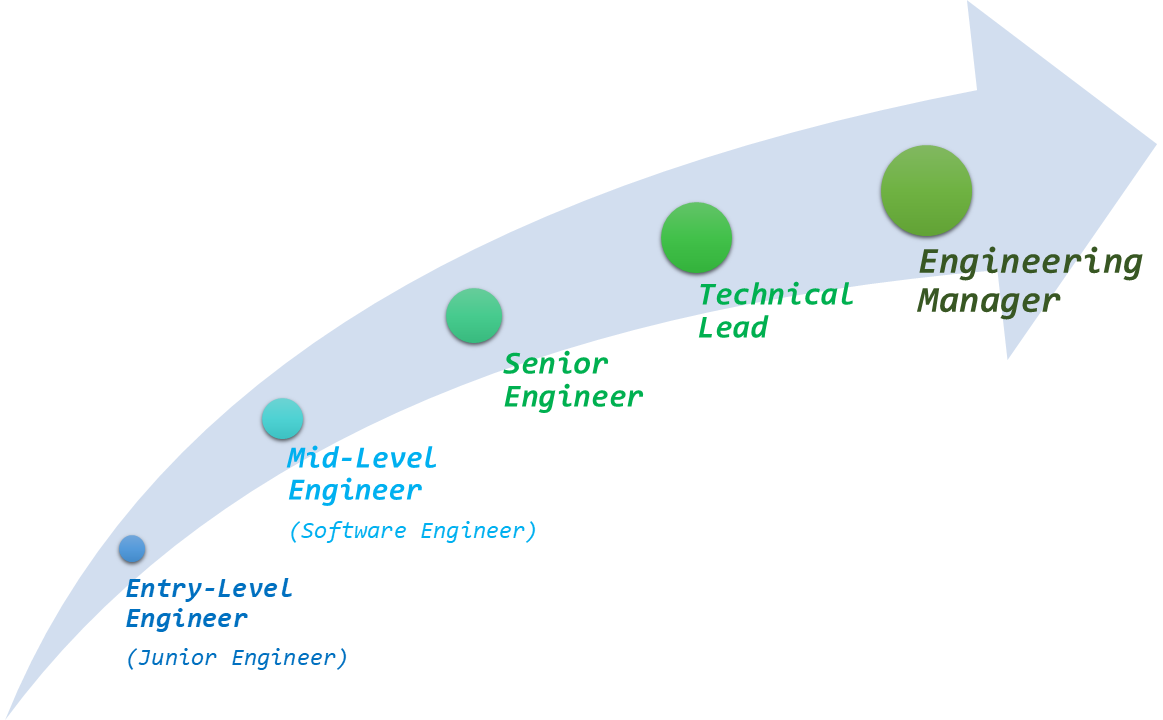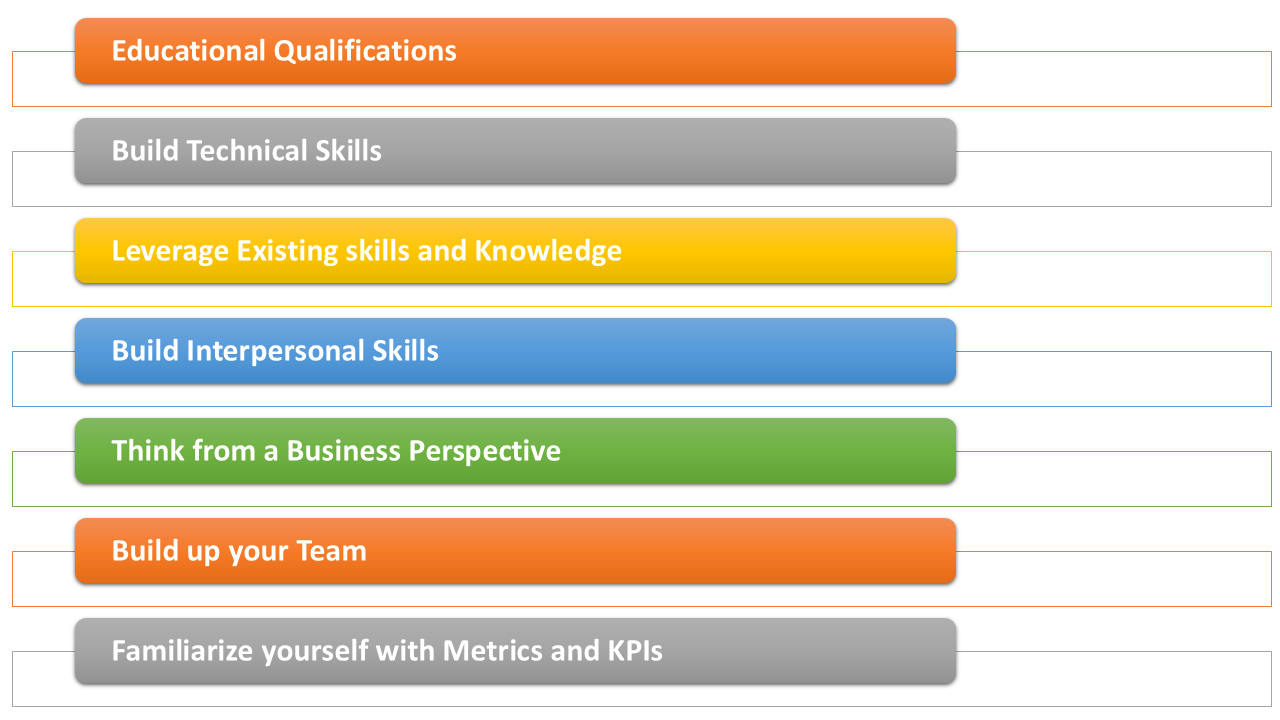Growth Plan for an Engineering Manager
|
|
People have different ways of getting things done. Some are better at planning ahead, inspiring others, doing the technical work, building relationships, or giving orders. It’s okay to be good at just one of these things if you’re working on your own. But if you’re in charge of a team, you need to have a mix of skills.
If you’ve recently climbed the ladder to the Engineering Manager position, or are someone who is looking to up their game, then here is a guide to help you prepare for this role.
We will first look at what being an Engineering Manager entails and then the skills needed to get there.

Career Progression of an Engineering Manager
You will see the following career progression for someone who is becoming an Engineering Manager through the traditional path.

Entry-Level Engineer (Junior Engineer)
- What it is: This is where most engineers start after graduation. You’ll typically work on specific tasks or projects under the guidance of more experienced team members.
- Focus: Learning and gaining technical skills. This stage is all about building a solid foundation.
Mid-Level Engineer (Software Engineer, Developer)
- What it is: After a few years of experience, you move up to a mid-level role. You’ll take on more complex projects and may start mentoring junior engineers.
- Focus: Deepening technical expertise and starting to take on leadership responsibilities like leading small projects or initiatives.
Senior Engineer
- What it is: At this level, you are expected to have a significant depth of knowledge and experience. Senior Engineers often take the lead on major projects and are responsible for architectural decisions.
- Focus: Strategic thinking, mentoring others, and driving projects to success. You may also start to interact more with stakeholders.
Technical Lead (Tech Lead)
- What it is: This is often a transitional role where you still focus on technical work but also guide and oversee the engineering team’s efforts.
- Focus: Balancing hands-on technical work with team leadership. You’re the go-to person for technical decisions and guidance.
Engineering Manager
- What it is: This is a management role where you’re responsible for overseeing a team of engineers. You focus on team performance, project delivery and aligning engineering work with business goals.
- Focus: People management, project oversight and strategic decision-making. Your success depends on the success of your team.
Different Paths to Become an Engineering Manager
-
The Traditional Route
This is the most common path, where engineers start as individual contributors and gradually move up the ladder. You’ll typically start as a junior engineer and gain experience and technical skills. As you demonstrate your abilities and take on more responsibilities, you might become a senior engineer, team lead or project manager. From there, the natural progression is to engineering management.
-
The Entrepreneurial Route
If you have entrepreneurial aspirations then starting your own company can be a direct path to engineering management. As the founder or co-founder of a tech startup, you’ll be responsible for leading the engineering team and making key decisions. This experience can provide valuable leadership skills and prepare you for management roles in larger organizations. Here ia an article about startup and testing failures.
-
Shift to Management Early
Some engineers may choose to transition to management sooner, possibly after just a few years. This could involve taking on roles like Tech Lead or Project Manager where you can begin to develop management skills without necessarily being fully in a managerial position.
-
Dual-Track Career
In some organizations you can follow a dual track where you can remain a technical expert (like a Principal Engineer) while also pursuing management opportunities. This allows you to grow in both areas without feeling pressured to choose one over the other.
-
Cross-Disciplinary Moves
If you have a background in a related field (like product management or project management), you might transition into an engineering management role by leveraging your understanding of both engineering and business needs.
-
Education and Certifications
Pursuing further education (like an MBA) or certifications in management can provide you with the necessary skills and credibility to move into an Engineering Manager role. This route emphasizes formal training in leadership and management principles.
General Responsibilities: Engineering Manager
| Responsibility | Description |
| Team Management | Overseeing the performance of engineering teams, assigning tasks and providing guidance. |
| Project Management | Planning, organizing and executing engineering projects. Ensuring they meet deadlines and quality standards. |
| Technical Leadership | Providing technical expertise and guidance to the team. Staying up-to-date with industry trends. |
| Resource Allocation | Managing the allocation of resources (e.g., budget, personnel) to ensure efficient project execution. |
| Performance Evaluation | Assessing the performance of team members, providing feedback and identifying areas for improvement. |
| Hiring and Onboarding | Recruiting and onboarding new engineering talent. Ensuring they have the necessary skills and fit within the team culture. |
| Communication | Effectively communicating with team members, stakeholders and senior management. |
| Problem-Solving | Identifying and resolving technical and organizational challenges. |
| Strategic Planning | Contributing to the development of long-term engineering strategies and goals. |
| Mentorship | Guiding and mentoring junior engineers. Fostering their professional development. |
| Reporting | Provide regular updates to upper management on project progress and team performance. |
Growth Plan for Successful Engineering Manager
Here are some points that will help you figure out your way through this role.

Educational Qualifications
While there isn’t a strict educational path to becoming an Engineering Manager, certain qualifications and experiences can be beneficial for this role.
- Bachelor’s Degree: A degree in engineering (computer science, electrical engineering, mechanical engineering, etc.) is typically the minimum requirement. This provides foundational technical knowledge.
- Master’s Degree (Optional): An MBA or a Master’s in Engineering Management can be advantageous. These programs often cover leadership, project management and business strategy, enhancing managerial skills.
-
Certifications (Optional): Professional certifications can bolster your qualifications such as:
- Project Management Professional (PMP): Demonstrates project management expertise.
- Certified ScrumMaster (CSM): Useful for managing Agile teams.
- ITIL Certification: Focuses on IT service management.
Finally, continuous learning is going to be your best step ahead. Engaging in workshops, discussions with peers, online courses or attending industry conferences can help keep your skills current and relevant.
Hone those Technical Skills
While you don’t need to be the most technical person on the team, a good Engineering Manager should have enough technical knowledge to engage with their team meaningfully and understand the challenges they face.
Here’s what you need to know:
- Core Technologies: A solid grasp of the technologies, programming languages and tools your team uses. This will help you in making informed decisions, troubleshooting issues and guiding the team effectively. It also builds credibility with your engineers.
- Software Development Lifecycle (SDLC) Knowledge: Familiarity with various phases of software development, from requirements gathering to design, implementation, testing and deployment. Understanding the SDLC enables you to manage projects effectively, identify bottlenecks and ensure quality delivery.
- Technical Architecture and Design Principles: Knowledge of system architecture, design patterns and best practices in software design. This helps you make decisions about system design and architecture that align with business goals and technical feasibility.
- Agile Methodologies: Familiarity with Agile practices (like Scrum or Kanban) and frameworks for managing software development. Many engineering teams operate using Agile methodologies. Understanding these practices enables you to facilitate processes effectively and improve team collaboration.
- DevOps and CI/CD Practices: Knowledge of DevOps principles, continuous integration and continuous deployment (CI/CD) practices. These practices are crucial for streamlining development and deployment processes, enhancing collaboration between development and operations teams.
- Data Analysis and Metrics: Understanding how to analyze metrics related to team performance, code quality and project progress. Data-driven decision-making can improve team efficiency and product quality. Knowing what metrics to track helps you identify areas for improvement.
- Problem-solving and Debugging Skills: Ability to diagnose and address technical issues when they arise. Being able to step in and help solve complex problems shows your team that you’re engaged and capable. This in turn fosters trust and respect.
You can then delve deeper into the technologies that your organization uses and even do a few courses to brush up or learn them.
Leverage Existing Skills and Knowledge
You must have picked up useful professional skills in your career so far. Identify and emphasize skills from previous roles that are relevant to management, such as communication, organization or team collaboration. For example, if you have experience in project coordination or customer service then highlight your ability to manage relationships and understand needs.
Work on Your Interpersonal Skills
As an Engineering Manager, you will require a variety of interpersonal skills to effectively lead teams and collaborate with stakeholders. Here are the most important ones:
- Communication Skills: Clear communication is essential for conveying expectations, providing feedback and facilitating discussions.
- Emotional Intelligence: Understanding and managing your own emotions, as well as empathizing with others fosters a supportive team environment. Recognizing team members’ feelings and motivations will help you in resolving conflicts and building strong relationships.
- Active Listening: Listening attentively to team members promotes open dialogue and ensures everyone feels heard. Show genuine interest in team members’ ideas and concerns.
- Conflict Resolution: Conflicts can arise in any team and effective resolution is crucial for maintaining a positive work environment. Address disputes promptly and fairly by helping team members find common ground and solutions.
- Adaptability: The ability to adjust to changing circumstances and team dynamics is crucial for effective management. Learn to stay flexible in your approach to leadership and decision-making.
- Ability to inspire: The ability to inspire and motivate others is key to leading a team effectively. Use persuasive communication to align the team with organizational goals and motivate them to perform at their best.
- Networking Skills: Building relationships within and outside the organization enhances collaboration and opens opportunities. Engage with other departments, stakeholders and industry professionals to foster connections that can benefit you and your team.
Start Thinking from a Business Perspective
As an Engineering Manager, you have now entered the realm of the hierarchy that can affect change at a large scale within the organization. Your decisions can no longer revolve just around technical considerations because your higher ups are going to expect more from you. Understanding the business context is going to be crucial for making informed decisions that align engineering efforts with organizational goals.
Here’s how you can go about that:
- Understand the Company’s Vision and Strategy: Familiarize yourself with the company’s mission, vision and strategic objectives. This knowledge allows you to align your team’s projects and goals with broader organizational priorities to ensure that engineering work contributes to overall success.
- Learn the Financial Aspects: Gain a basic understanding of financial metrics, budgeting and how engineering projects impact the bottom line. Understanding these implications will help you make decisions that optimize resources and justify investments in technology and personnel.
- Engage with Other Departments: Collaborate with teams such as product management, marketing and sales to understand their challenges and objectives. These interactions provide insights into how engineering impacts other functions and customer satisfaction.
- Participate in Business Meetings: If you have the opportunity, then attend strategy sessions, product planning meetings and other business-related gatherings. Being involved in these discussions will help you understand the company’s direction and priorities while allowing you to contribute an engineering perspective.
- Stay Informed About Market Trends: Keep up with industry trends, competitors and emerging technologies that could affect your business.
Build up Your Team
A manager needs people to manage. At this level, you will even have some control over who is a part of your team. Use this opportunity to create an efficient and dependable team.
Here’s how you can go about it:
- Figure out Whom to Hire: Assess your team and then decide what type of candidate is best suited. Along with technical skills, do consider if the candidate is a good fit for the team.
- Mentoring and Coaching: Supporting the growth and development of team members enhances their skills and contributes to team success. Provide guidance, share knowledge and encourage junior team members to take on new challenges.
- Cultural Awareness: Understanding different cultural backgrounds and perspectives is essential for effective communication and collaboration in diverse teams.
- Encourage a Business Mindset in the Team: Foster discussions about how engineering work ties into business goals and encourage team members to think about the end user and business impact. This will create a culture where the team understands the value of their work beyond technical aspects which will further give them motivation and purpose.
Familiarize Yourself with Metrics and KPIs
Metrics and KPIs are great for understanding how your team is performing. You can track other business metrics as well to see how the organization and the engineering department as a whole are doing. This practice will help you connect technical performance with business success and identify areas for improvement. In fact, quite often, you’ll find yourself having to present metrics in front of higher management too.
However, keep in mind that metrics are not the ultimate truth and one should not trust them blindly.
What Not to do as an Engineering Manager?
Being a manager can be difficult and exciting at the same time. You might find yourself falling into patterns that might have adverse consequences in the long run. Here is a no-no list of some things that you need to watch out for:
- Micromanaging: It is if you overly control every aspect of your team’s work. This will stifles creativity and autonomy and lead to frustration and disengagement. Trust your team to make decisions and take ownership of their work.
- Neglecting Communication: Failing to provide clear communication about project goals, expectations and feedback can be a problem. It can lead to misunderstandings, decreased productivity and a lack of alignment within the team.
- Ignoring Team Dynamics: Overlooking interpersonal conflicts or team dynamics can create a toxic work environment and affect collaboration.
- Being Unapproachable: Creating a barrier that makes team members hesitant to come to you with issues or ideas.
- Failing to Recognize Contributions: Not acknowledging or celebrating team achievements and individual contributions can cause problems. Recognition boosts morale and motivates team members. Make it a habit to celebrate successes, both big and small.
- Becoming Too Focused on Metrics: While metrics are important, they shouldn’t be the sole focus. Balance quantitative data with qualitative insights to understand team dynamics and health.
- Resisting Change: Being inflexible or resistant to new ideas, technologies or processes hinders growth.
Engineering Manager: Tips for the Road Ahead
Here are some more tips to help you along the way:
- Try to Adapt Quickly to the New Environment: This stands true with any role you are in. The sooner you start picking things up and taking on your responsibilities, the better you’ll be received by your team and managers. This also includes familiarity with processes within your organization for project kick-off, project closure and production bugs.
- Score Quick Wins: You need to deliver quickly and preferably frequently. So look for those small wins along with the big projects. These could involve bug fixes or even pushing a long overdue client request in the development pipeline.
- Seek Opportunities to Gain Experience: Look for opportunities within your current role like leading a small project or mentoring junior colleagues, to gain management experience. You can join cross-functional teams or initiatives that allow you to take on leadership responsibilities.
- Network and Find a Mentor: Yes, as a manager you will mentor your team members. But what about those times when you need some mentoring? Networking can open doors to mentorship opportunities where you can learn from others’ experiences.
- Seek Feedback and Reflect: You need to get comfortable with being on the receiving end from time to time. Constructive feedback will help you identify strengths and areas for improvement. Reflecting on this input will further allow you to make targeted changes. You could ask for feedback from your peers, mentors and team members about your leadership style and effectiveness.
- Learn from Role Models: Observe and study effective leaders within your organization or industry. Pay attention to their communication styles, decision-making processes and how they handle challenges. Emulating the qualities of successful leaders can provide you with a roadmap for your own development.
- Develop Decision-Making Skills: Effective leaders need to make informed decisions quickly. Practice making decisions by analyzing various scenarios and considering both short-term and long-term impacts.
- Create a Vision: Develop a clear vision for your team or projects. If there are processes that you think your team can benefit from, then introduce them.
At the end of the day, you need to help your team achieve its targets and aim to meet the organization’s goals.
Additional Resources
- How to Become an Engineering Manager
- Metrics for Engineering Manager
- Engineering Levels in Different Companies Compared
- QA from an Engineering Leader’s Perspective
- How to Increase Engineering Output Using AI
- How to Align Software Engineering with Business Goals
- How to use AI to improve QA engineering productivity?
| Achieve More Than 90% Test Automation | |
| Step by Step Walkthroughs and Help | |
| 14 Day Free Trial, Cancel Anytime |












